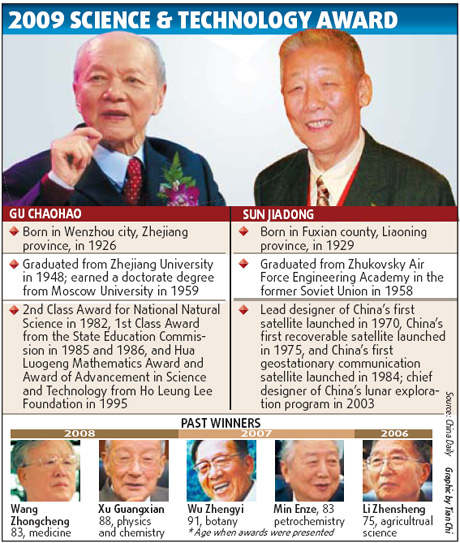Government and Policy
China's space pioneers hit new high
By Lin Shujuan and Xin Dingding (China Daily)
Updated: 2010-01-12 08:19
 |
Large Medium Small |

The nation's top science and technology award for 2009 has been presented to two scientists who have made great contributions to the country's space development.
Gu Chaohao, 83, whose achievements in mathematics helped set a solid theoretical basis for China's space development; and space scientist Sun Jiadong, 80, received the award from President Hu Jintao yesterday morning in Beijing.
Gu was honored for his contributions to differential geometry, partial differential equations and mathematical physics, the awards committee said, while Sun was recognized for his 50-year contribution to the nation's space industry and continuing service on the frontlines of space technology. They were presented 5 million yuan ($733,000) each.

"When Gu started his mathematics studies, I don't think he would have realized how much he would contribute to the country's space industry," said Qi Faren, the chief designer of Chinese spacecraft since the launch of the Shenzhou manned spacecraft prototype in 1999.
"But his specialized fields, like impartial differential equations, have made the development of space science and technology much easier and far less costly."
Illustrating his point, Qi said before the use of impartial differential equations, testing a spacecraft meant flying one. However, thanks to the development of the theory, scientists can now test a spacecraft by simulating models on computers.
The application of Gu's mathematics theories goes well beyond the space industry, according to Mu Mu, one of Gu's post-doctorate students in the 1980s and now a researcher with the Institute of Atmospheric Physics, Chinese Academy of Sciences.
For example, scientists now rely mostly on partial differential equations for reliable weather forecasts.
While scientists like Gu provided the theoretical basis for China's space development, Sun, chief designer of the nation's lunar exploration program, helped make the space dream a reality.
Colleagues remember him for his courage in asking for the removal of badges and sayings of Chairman Mao Zedong from a satellite to be launched in 1970 because they would affect the weight and reflectivity of the satellite and jeopardize the project.
| ||||
Ouyang Ziyuan, top scientist in the lunar exploration program, said Sun, as the program's chief designer, impressed him most by his ability to handle complicated issues.
"I raised many requirements in the hope of getting as much data as possible for research. But he stood firm, adopted an engineer's point of view and focused on the fundamental issue - to make orbiting come true," said Ouyang. "He said scientists complicate simple problems, while engineers' task is to simplify them."
In a letter to congratulate his 80th birthday last year, the late Qian Xuesen, considered the "Father of Space Technology", wrote: "You have made an outstanding contribution to China's space development, something the country and the people will not forget. I am proud of your achievement."
Sun regards yesterday's honor as a sign of the country's respect and encouragement for science and technology, and a matter of pride for space scientists.
The highest science prize annually awarded by the Chinese president is granted to no more than two outstanding scientists each year. It honors important breakthroughs in basic scientific research with far-reaching influence. It also rewards prominent scientists who have generated enormous economic returns or facilitated social progress.
So far, 16 scientists have been honored for their achievements. Wang Yongzhi, chief designer of China's manned space program, won the award in 2003.
"The State Science and Technology Award is regarded as a sign of both recognition and encouragement for scientists," said Qi. "The fact that two of the 16 scientists are from the space industry means two things: The government has recognized what we've achieved over the last decade and will continue to offer strong support for space development."
The nation has made rapid strides in the space industry over the past decade.
After the successful launch of the first manned spacecraft in 2003, the country marked the first spacewalk in December 2008.
Three month later, the first lunar probe concluded its 16-month mission, mapping and creating 3D images of the lunar surface.
Currently, China is preparing for a soft landing on the moon in 2012 with a rover vehicle. By around 2017, it hopes to have samples from the moon.











